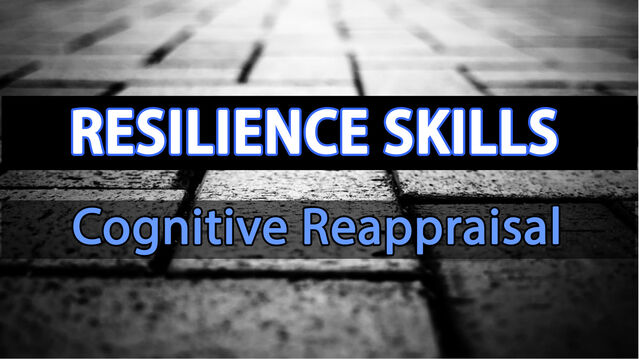Resilience
More Than Silver Linings: Resilience, Awe, and Perspective
Things don't always go the way we want; resilience comes from how we handle it.
Posted November 21, 2022 Reviewed by Abigail Fagan
Key points
- Cognitive reappraisal is not about ignoring the bad or stressors; it's about also making time for the good.
- Practicing cognitive reappraisal is good for your mental health.
- Cognitive reappraisal is linked with other resilience practices like experiencing awe.
A key aspect of resilience is coming to grips with the fact that certain things throughout our lives are out of our control, and things do not always go the way we want.
Think about it: Our resilience is not enhanced by watching videos, listening to podcasts, or reading books and articles (but please—do continue reading, I have a point to make!). The only way to enhance the resilience we already have in us is by taking action. Of course, videos and reading are intended to serve the purpose of inspiring action. Positive thinking is supposed to lead to positive action.
That’s the purpose of this post—to explain a critical resilience practice called cognitive reappraisal and to provide practical ways to utilize it.

What Cognitive Reappraisal Is
As resilience expert and fellow Columbia colleague Dr. George Bonanno, explains, we need to have a variety of resources and practices available to use, as resilience is not a one-practice-fits-all type of thing. Cognitive reappraisal is one of those practices that can help in a variety of moments. Cognitive reappraisal refers to applying a perspective to a situation in which you try to take something positive from it, regardless of what occurred—especially, though, if it was a negative situation. Importantly, practicing cognitive reappraisal does not diminish or ignore the negative aspects; instead, it makes time for it and then also makes time for finding something good.
This refers to another important resilience term called acceptance. Acceptance is not falling into a mindset of toxic positivity, involving false, unhealthy thinking that everything is OK and the world is full of rainbows, unicorns, and butterflies. The world, and life, includes hardships, stressful moments, times of pain and suffering, and other challenges throughout our lives. However, a person with a resilient mindset does not throw their hands up in defeat and wallow in their misery thinking they have no control over things.
Instead, acceptance means acknowledging this, learning from it, doing what you can, and figuring out the best, healthiest way to move forward. This is exactly where cognitive reappraisal comes in. Cognitive reappraisal is recognizing the “bad” while also making time for the “good.”
I call this having balance in life, and that is good for your overall well-being. Further, the research on practicing cognitive reappraisal has shown the potential benefits to be reduced stress and anxiety, increases in social connectedness, meaning and purpose in life, overall well-being, and life satisfaction.
Cognitive Reappraisal in Use
I have implemented cognitive reappraisal practices in a variety of research studies, programs, and workshops related to resilience and mental health—this includes for hostage negotiators, in leadership training, and with NASA employees. I advise people that it can be challenging for them, and, if it is, that can be a good thing—I call these practices part of your mental health workouts.
Before we get to examples for you to try out, here are two examples from participants from a research study I conducted focusing on experiencing awe. Yes, awe is one type of resilience practice that many who have participated in these studies have found support their resilience and mental health. Experiencing awe, especially on a daily basis, can have a positive impact on one’s life, and it is connected to many other resilience practices aside from cognitive reappraisal such as gratitude, finding meaning and purpose in life, and social connectedness (for more on awe research, see the references at the end).
Importantly, experiencing awe is not limited to only once-in-a-lifetime moments like visiting the Grand Canyon or Great Barrier Reef. As awe researchers Marianna Graziosi and Dr. David Bryce Yaden explain, those experiences are clearly an ordinary response to something extraordinary. However, awe can also be an extraordinary response to something ordinary. This means trying to find it in our daily lives— those moments are there if we take a certain perspective. Dr. Kirk Schneider refers to this as being open to awe experiences instead of trying to "find" them.
The benefits of experiencing and reflecting on awe are vast and include supporting social connections, creativity and critical thinking, curiosity, humility, optimism, emotion regulation, gratitude, open-mindedness, and prosocial behaviors, while also reducing stress.
The following research data shows how participants in an awe study connected experiencing awe with cognitive reappraisal:
"Reminded me that there is awe all around you and try to pause and take it in."
"Made me think of how fast life is and to remember to try and enjoy it as much as possible. Try not to overlook the beautiful things because there are so many right in front of you."
The above example demonstrates how an awe experience can allow you to “see things differently,” which are often everyday life situations and, therefore, supportive of your overall wellness.
Finally, if there is one example that shows how helpful cognitive reappraisal can be for daily issues beyond our control, this research study participant has it covered:
"I’m starting to think of how my long traffic-filled commute benefits me instead of how much I hate New York City traffic."
Try It: Exercise
Remember, no amount of positive thinking can replace positive action. So, hopefully, the previous comments from others are inspiring you to take action. For example, think of a time in the past that seemed ordinary then, but now reflecting on it, it was something that was truly an awe moment (and included other positive emotions too). Take an additional moment and think about why it evokes awe and other positive emotions now. This exercise doesn't have to take long—it is about making the time for it.
Here's another example and let's use it for forward thinking. At the time of writing this, it is Thanksgiving week. Sure, you might be dreading seeing a certain family member or the holiday traffic but now think of something good about going, too, and why it is good. Again, it's about dedicating just a few moments to practice this.
Conclusion
The goal of this post was to share how an important resilience practice, cognitive reappraisal, is accessible to everyone and how it is connected to other valuable resilience practices including awe. When developing resilience practices like cognitive reappraisal and others, remember a few important things—first, it takes practice, which then can become habit, and ultimately part of your lifestyle.
Also, don’t forget to be fair with yourself—this is not about treating yourself harshly or not allowing yourself to heal during tough moments in life. We all deserve to have positive mental health, and that certainly includes you.
References
Bonanno, G. A. (2013). Meaning making, adversity, and regulatory flexibility. Memory 21, 150–156. doi: 10.1080/09658211.2012.745572
Graziosi, M. (2018). In awe of each other: An exploration of awe in close relationships. [Master’s thesis, University of Pennsylvania]. https://repository.upenn.edu/mapp_capstoneabstracts/156/
Graziosi, M., Yaden, D. (2019). Interpersonal awe: Exploring the social domain of awe elicitors. Journal of Positive Psychology, 16, 263–271. https://doi.org/10.1080/17439760.2019.1689422
Ochsner, K. N., Ray, R. R., Hughes, B., McRae, K., Cooper, J. C., Weber, J., et al. (2009). Bottom-Up and top-down processes in emotion generation: common and distinct neural mechanisms. Psychol. Sci. 20, 1322–1331. doi: 10.1111/j.1467-9280.2009.02459.x
Southwick, S. M., and Charney, D. S. (2018). Resilience: The science of mastering life’s greatest challenges. Cambridge, UK: Cambridge University.
Thompson, J. (2022). Enhancing resilience: An interpretative phenomenological analysis of The Awe Project. Journal of Community Safety and Well-Being, 7(3), 93-110. https://doi.org/10.35502/jcswb.265
Thompson, J., Grubb, A.R., Ebner, N., Chirico, A., & Pizzolante, M. (2022). Increasing crisis hostage negotiator effectiveness: Embracing awe and other resilience practices. Cardozo Journal of Conflict Resolution, 23(3), 615-685. https://static1.squarespace.com/static/60a5863870f56068b0f097cd/t/62c5b…
Thompson, J. (2022). Awe: Helping leaders address modern policing problems. Journal of Community Safety and Well-Being, 7(2), 53-58. https://doi.org/10.35502/jcswb.239
Thompson, J. (2022). Awe narratives: A mindfulness practice to enhance resilience & wellbeing. Frontiers in Psychology/Positive Psychology. https://www.frontiersin.org/articles/10.3389/fpsyg.2022.840944/abstract




